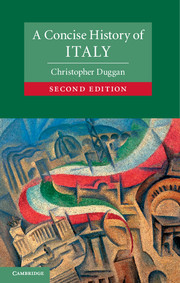Book contents
- Frontmatter
- Contents
- List of Illustrations
- List of Maps
- List of Tables
- Preface
- Chronology
- Introduction
- 1 The geographical determinants of disunity
- 2 Disunity and conflict: from the Romans to the Renaissance, 400–1494
- 3 Stagnation and reform, 1494–1789
- 4 The emergence of the national question, 1789–1849
- 5 Italy united
- 6 The liberal state and the social question, 1870–1900
- 7 Giolitti, the First World War, and the rise of Fascism
- 8 Fascism
- 9 The Republic
- Bibliographical essay
- Index
3 - Stagnation and reform, 1494–1789
Published online by Cambridge University Press: 05 June 2014
- Frontmatter
- Contents
- List of Illustrations
- List of Maps
- List of Tables
- Preface
- Chronology
- Introduction
- 1 The geographical determinants of disunity
- 2 Disunity and conflict: from the Romans to the Renaissance, 400–1494
- 3 Stagnation and reform, 1494–1789
- 4 The emergence of the national question, 1789–1849
- 5 Italy united
- 6 The liberal state and the social question, 1870–1900
- 7 Giolitti, the First World War, and the rise of Fascism
- 8 Fascism
- 9 The Republic
- Bibliographical essay
- Index
Summary
The Invasions of Italy
Despite political and economic uncertainties, the leading families of the Italian city states in the later fifteenth century enjoyed a strong sense of superiority. They formed an elite, not entirely closed, but one whose values and aspirations were in general more aristocratic than those of their merchant forebears. The Medici and the Strozzi were still great banking families, but their wealth was invested increasingly in urban palaces, country villas, and works of art. Sensibility, learning, and a certain disdain for money per se became the touchstones of status: when Giuliano Zancaruol commissioned a painting from Giovanni Bellini, he stressed that the cost was unimportant, ‘as long as it is beautiful’. The achievements of Alberti, Pisanello, Mantegna, Botticelli, Bramante, or Leonardo gave their patrons feelings of importance that spilled over all too frequently into complacency. There were many in Italy who felt that their civilisation not only rivalled but perhaps even surpassed that of the ancients.
The sense of self-assurance was undermined by the long sequence of wars that rocked the peninsula from 1494. Charles VIII’s conquest of Naples and the subsequent invasions by Spanish, French, and Imperial troops were widely seen as acts of divine retribution, punishments for the excess of wealth and worldliness in Italy. The historian Francesco Guicciardini reported that the arrival of Charles VIII’s army was preceded by awesome prodigies: in Apulia, three suns shone in the middle of the sky at night, while in Arezzo, ‘an infinite number of armed men on great horses passed through the air, with a terrible noise of trumpets and drums’. By the time Guicciardini wrote this in the 1530s, the Italian states had been reduced to mere pawns in an international power struggle. Spain controlled Sicily, Naples, Sardinia, and Lombardy; the constitutions and boundaries of other territories had been radically redrawn; and Rome had been sacked. Disillusionment had begun to replace the earlier feelings of supremacy.
- Type
- Chapter
- Information
- A Concise History of Italy , pp. 60 - 86Publisher: Cambridge University PressPrint publication year: 2013



